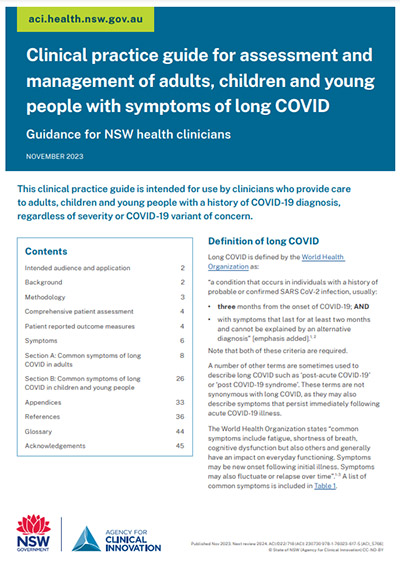
Clinical practice guide for assessment and management of adults, children and young people with symptoms of long COVID
Published: November 2023. Next review: 2028.
This clinical practice guide is intended for use by clinicians across NSW who provide care to patients with a history of COVID-19 diagnosis, regardless of severity or COVID-19 variant of concern.
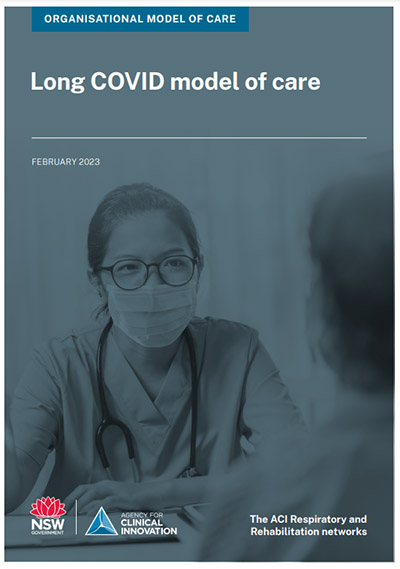
Long COVID Model of Care
Published: February 2023. Next review: 2025.
The Long COVID Model of Care outlines a standardised approach to caring for people with long COVID to ensure patients receive the right care at the right time.
This model describes the different stages of care and the different settings where care can be delivered by general practitioners, Aboriginal Medical Services (AMSs), primary health networks (PHNs), local health districts (LHDs) and specialty health networks (SHNs), depending on a person’s needs.
Patient education, health coaching and self-management are at the core of each stage of this model.
The model has been developed in consultation with the Long COVID Clinical Expert Reference Taskforce (LC-CERT). It can be adapted by PHNs, LHDs and SHNs to ensure it meets local needs.
There are four stages through which people with symptoms of long COVID may receive care.
The GP/AMS remains an integral part of the healthcare team at all stages of treatment.
Stage 0
Self-managed
- Mild symptoms
- Low risk
- High indepedence
- High quality of life
Stage 1
Primary care by general practitioners/Aboriginal Medical Services with the use of post-COVID-10 Conditions Health Pathway
- Moderate symptoms
- Low-medium risk
- Moderate indepedence
- Moderate quality of life
Stage 2
Integrated Care management by local health district/specialty health network
- High symptoms
- Medium-high risk
- Moderate-low indepedence
- Moderate-low quality of life
Stage 3
Multidisciplinary specialised care by LHD/SHN teams, clinics and services.
- Severe symptoms
- High risk
- Low indepedence
- Low quality of life
The majority of people with COVID-19 will recover completely within a few weeks of getting the infection, but a small number of people will continue to experience symptoms for weeks or months. This is defined as ‘long COVID’.
People with long COVID can experience a variety of symptoms that impact their quality of life, wellbeing and capacity to return to work.
Currently across NSW, there is large variability in the type and location of care available for people with symptoms of long COVID. Access to services also varies, which can lead to under- or over-referral to the right level of care, and poor patient experience and outcomes.
This model of care has been developed to address these issues and improve patient outcomes.
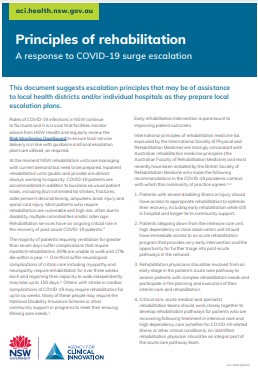
Principles of rehabilitation
Published: June 2022. Next review: 2024.
This document suggests escalation principles that may be of assistance to local health districts and/or individual hospitals as they prepare local escalation plans.
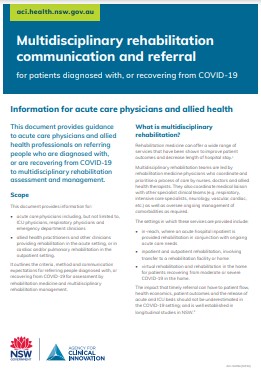
Multidisciplinary rehabilitation communication and referral - information for acute care physicians and allied health
Published: June 2022. Next review: 2024.
This document provides guidance to acute care physicians and allied health professionals on referring people who are diagnosed with, or are recovering from COVID-19 to multidisciplinary rehabilitation assessment and management.
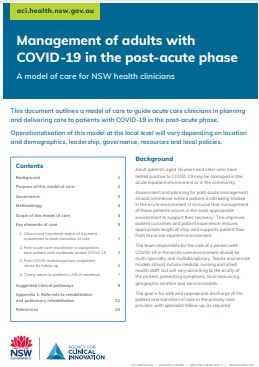
Management of adults with COVID-19 in the post-acute phase – A model of care for NSW health clinicians
Published: October 2021. Next review: 2024.
This document outlines a model of care to guide acute clinicians in planning for, and delivering, care to patients in the post-acute period. The aim is to improve patient outcomes and patient flow from the acute environment.